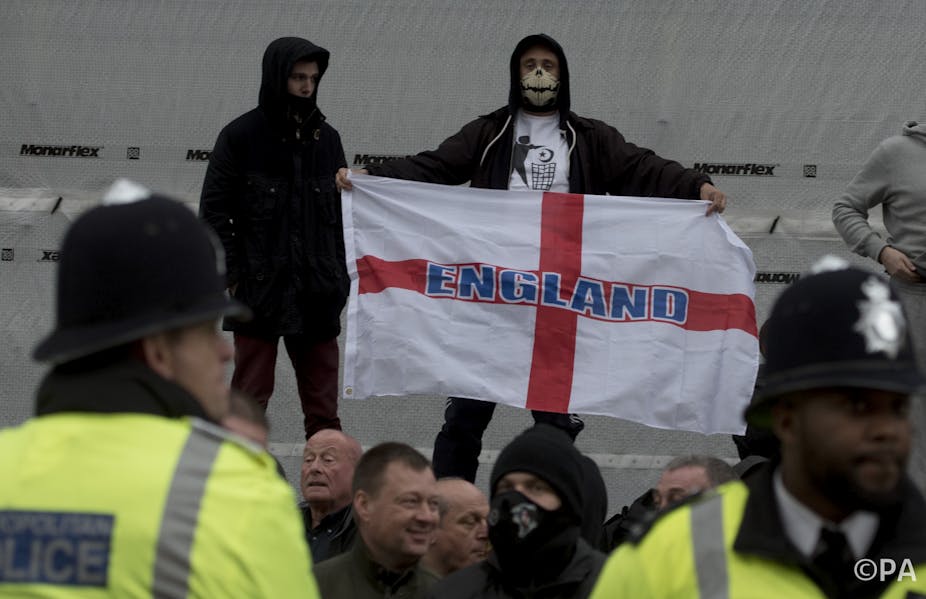The far-right, anti-Islam protest movemement Pegida has so far been largely based in Germany and has had limited success in the UK. But around 300 people are expected to attend a march in Birmingham on February 6.
Having been kept away from the city centre, the group, whose name is an abbreviation for Patriotic Europeans Against the Islamisation of the Occident, will undertake a “silent march” near Birmingham International train station.
The march will be lead by Tommy Robinson, the former leader of the far-right group the English Defence League (EDL). Its message, so Pegida claims, is “save our country, save our culture, save our future”.
But of course, what the group means by “our country” is hardly inclusive. As a far-right, counter-jihad movement, Pegida’s message on the day will undoubtedly be one that promotes division and hate.
Growth of a movement
Pegida was formed in Dresden in late 2014. At first it organised “evening strolls” for people concerned about the presence of Islam in Germany and the impact immigration was having on German culture. But the strolls rapidly grew into mass rallies. In January 2015, tens of thousands of people attended a Pegida protest held in Dresden the night after the Charlie Hebdo shootings. The anger of French caricaturists did not prevent attendees from carrying banners claiming “PEGIDA=CHARLIE”.
Katrin Oertel, one of the speakers at the rally announced: “We aren’t radicals or fanatics, we are a citizens’ movement.” Interestingly, research undertaken in Germany supports this. People attending Pegida rallies were from the middle classes and had not been particularly politically active before joining. Many said they had joined because Pegida gave them the chance to express feelings and resentments they felt unable to articulate elsewhere.
It’s highly unlikely that Pegida’s Birmingham rally will attract anything similar in terms of numbers or indeed types of people. Indeed, its march in Newcastle in February 2015 was dwarfed by the counter-protests organised on the same day.
Nevertheless, the spread of Pegida suggests a new and potentially significant development. This seems to be becoming a pan-European brand behind which those who are against Islam, Muslims and immigration can unite.
Pegida has already held rallies in Belgium, Denmark, Norway, Spain and Switzerland and various other locations. Functioning at the pan-European level could not only strengthen its mission but also has the potential to unite what were once disparate groups within the counter-jihad movement.
Robinson returns
Then there is the re-emergence of Robinson himself. Almost two years ago to the day, Robinson appeared to have undergone something of a Damascene conversion. He quit the EDL and suddenly presented himself as a victim of circumstance.
Despite years of aggressively ranting about Islam and Muslims in Britain, he claimed to simply be a misunderstood man. He appeared on TV programmes and at press conferences, rejecting street demonstrations and acknowledging the dangers of far-right extremism.

All of this was disingenuous nonsense. At no time did Robinson distance himself from the insidious ideology that underpinned the EDL nor did he refute the myths he perpetuated about Islam and Muslims, about mosques, shariah law, halal meat, Muslim women and grooming.
Robinson’s presence at the Birmingham Pegida rally would seem to prove that the events of two years ago were little more than a publicity stunt. If, as I wrote at the time, Robinson’s bad-boy-turned-good saw him emerge as a new messiah for the common and everyday man and woman, then his fronting of Pegida is surely his second coming.
This is Brum, not Dresden
A spirit of resisting divisive messages and actions has emerged in Birmingham in response to the arrival of Pegida. Shortly after the movement announced it was holding a rally in the city, more than 60 academics, community leaders, politicians and faith representatives (myself included) from across Birmingham came together to sign a statement of unity.
Recognising Birmingham’s proud tradition of being a place where different people live together harmoniously, others are being invited to sign the statement: to choose hope rather than the hate propagated by Pegida and its supporters. There will also be a unity celebration after Friday prayers at Birmingham Central Mosque on February 5, the day before the Pegida march.
Like those before it – be that the National Front, the British National Party or the EDL – Pegida will fail to gain a foothold in Birmingham. Its insidious message of hate seeks to pit community against community but this is a city too strong and united for that to work. Pegida’s 300 or so supporters will see that on Saturday.

